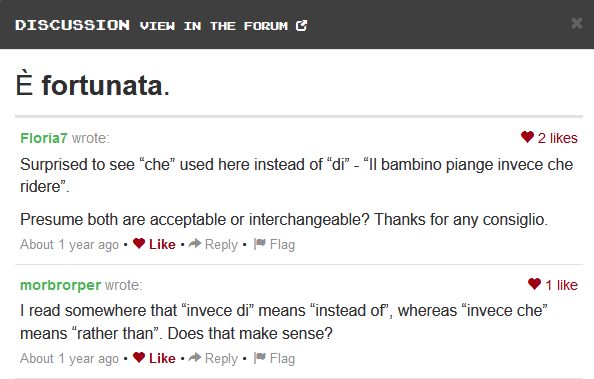Surprised to see “che” used here instead of “di” - “Il bambino piange invece che ridere”.
Presume both are acceptable or interchangeable? Thanks for any consiglio.
Surprised to see “che” used here instead of “di” - “Il bambino piange invece che ridere”.
Presume both are acceptable or interchangeable? Thanks for any consiglio.
I read somewhere that “invece di” means “instead of”, whereas “invece che” means “rather than”. Does that make sense?
Hi. Ah, you could be right. I hadn’t thought of that. If I hear of anything else, I’ll pop back to you. Ciao…
Later: yes, that’s it. As with all things Italian, it depends on the mood of the sentence. Thanks for your consiglio.
I had a session with la mia insengante (a recently retired primary school teacher in Italia) this evening and asked her about this one. She said that “invece di” is the more common of the two but that they’re effectively equal in meaning.
Mille grazie, davvero😊
Ciao LuciusVorenus, ho trovato questa frase, un altro esempio di “che” for “rather than” etc.
“Io preferisco uscire che stare a casa”.
Very useful. Ciao…
Just one small correction to that sentence:
Io preferisco uscire che stare a casa… in particolare, quando sono a Roma e posso andare a cena all’Osteria da Fortunata."
Ciao Lucius. Ho trovato l’Osteria da Fortunata su Google, e l’anno prossima chissà chissà;-) Non sono mai stata lì così devo aggiungerlo alla mia lista. Adoro Roma, specialmente per il Natale o l’anno nuovo, c’è un “ronzio” felice no? A dopo…
Why is this phrase

linked to this conversation that has nothing to do with the pharse?

Sois afortunados.
anyway, just wanted to say that the translation is wrong, it should be “es afortunada / (ella) tiene suerte”